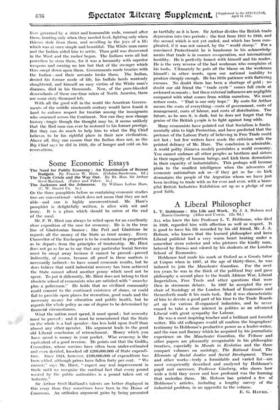Some Economic Essays
The Jacksons and the Johnsons. By William Loftus Hare. (C. W. Daniel Co. ls.)
Or the three pamphlets before us containing economic studies two are conventional—which does not mean that they are not
able—and one is highly unconventional. Mr. Hare's pamphlet is delightfully written, is alive with wit and irony. It is a plum which should be eaten at the end of the meal.
Mr. F. W. Hirst can always be relied upon for an excellently clear exposition of the case for economy. He is in the true line of Gladstonian finance ; like Peel and Gladstone he regards all the money of the State as trust money. Every Chancellor of the Exchequer is to be condemned in proportion as he departs from the principles of trusteeship. Mr. Hirst does not go so far as to say that any particular Social Service must be swept away because it cannot be proved—proved indirectly, of course, because all proof in these matters is necessarily indirect—to have sound economic results, but he does believe that until industrial recovery has been achieved the State cannot afford another penny which need not be spent. To put it differently, Mr. Hirst does not belong to that obsolete school of economists who are satisfied with " anarchy plus a policeman." He holds that no civilized community could consent to the continued existence of slums, or could fail to provide open places for recreation, good roads and the necessary money for education and public health, but he regards the whole policy as one of degree to be determined by financial circumstances.
What the nation must spend, it must spend ; but necessity must be proved ; and it must be remembered that the State on the whole is a bad spender—has less hold upon itself than almost any other spender. His argument leads to the good old Liberal conclusion of retrenchment. Money which you have saved is money in your pocket. Wise economy is the equivalent of a good revenue. He points out that the Geddes Committee, whose services have often been under-estimated and even derided, knocked off £200,000,000 of State expendi- ture. Since 1924, however, £100,000,000 of expenditure has been added, although prices have fallen forty per cent. " We cannot," says Mr. Hirst, " expect any real improvement in trade until we recognize the cardinal fact that every pound wasted by the public authorities is a pound taken out of industry."
Sir Arthur Steel-Maitland's talents are better displayed in this essay than they sometimes have been in the House of
Commons. An orthodox argument gains by being presented-
as tactfully as it is here. Sir Arthur divides the British trade depression into two periods : the first from 1921 to 1928, and the second which is not yet ended, and which has been com- plicated, if it was not caused, by the " world slump." For a convinced Protectionist he is handsome in his acknowledg- ments that trade is in essence co-operation, not international hostility. He is perfectly honest with himself and his reader. He is the very reverse of the bad workman who complains of his tools. Ultimately he puts all the blame on the workman himself:- in other words, upon our national inability to produce cheaply enough. He has little patience with flattering excuses. No doubt there has been a shortage of gold ; no doubt our old friend the " trade cycle " comes full circle at awkward moments ; but these external influences are negligible compared with what comes from within ourselves. We must reduce costs. " That is our only hope." By costs Sir Arthur means the costs of everything—costs of government, costs of management, costs of labour, and costs of distribution. The future, as he sees it, is dark, but he does not forget that the genius of the British people is to fight against long odds.
Many economists have pointed out that Socialism is funda. mentally akin to high Protection, and have predicted that the pretence of the Labour Party of believing in Free Trade could not last ; but few writers have made the criticism with the pointed delicacy of Mr. Hare. The conclusion is admirable. A world polity (Geneva model) postulates a world economy. You cannot embrace all other peoples as brothers and sisters in their capacity of human beings, and kick them downstairs in their capacity of industrialists. This perhaps will become plain to the smallest intelligence when the advocates of economic nationalism ask us—if they get so far—to kick downstairs the people of the Argentine whom we have just been inviting to trade with us for ever and ever, with a beau- tiful British Industries Exhibition set up as a pledge of our good faith.














































 Previous page
Previous page